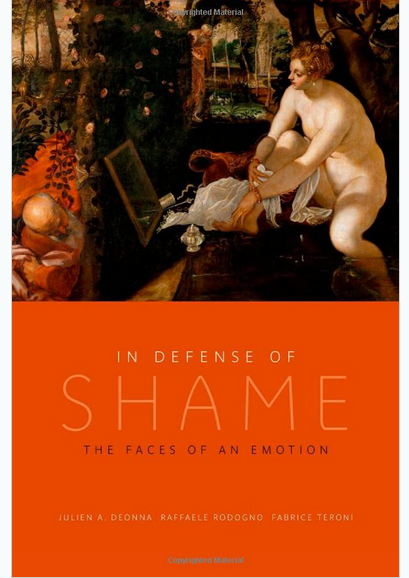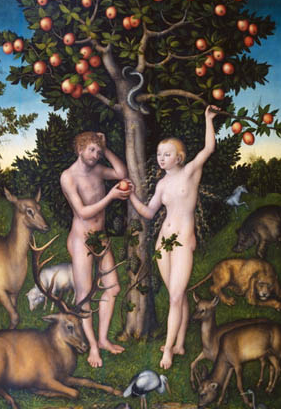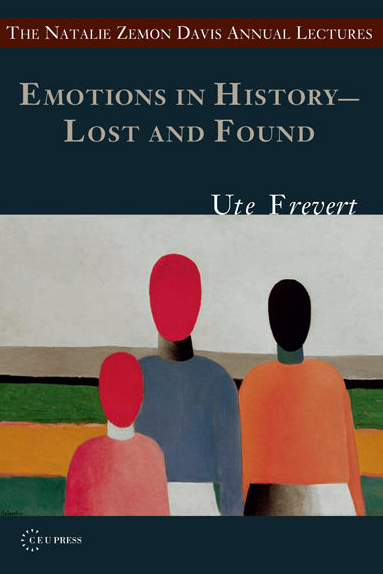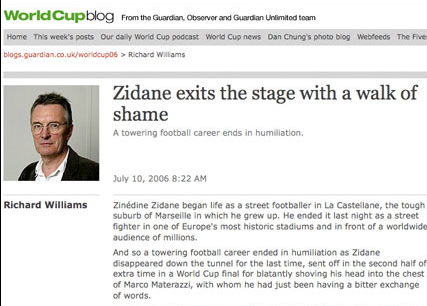When did you last feel shame? Today? Yesterday? Last week? Last year? In my case, I reckon the answer is 1983.
Now, there may be many reasons why I have felt no shame for the last twenty-nine years. It could be that I am a saint, or a sociopath; that I never do anything shameful or am pathologically unable to recognise it when I do. It could be that I am misidentifying my emotions. Maybe on occasions when I think I am feeling embarrassment, or regret, or guilt, or anger at myself, in fact I am feeling shame. But I doubt it.
Looking back over a week of posts about shame on this blog, in which shame has been analysed philosophically, politically, aesthetically, and sexually, I am all the more convinced that it’s just not a feeling I have in my repertoire. I understand the logic of shame as a kind of unseen substance invoked in connection with publicly acknowledged moral failures. And I might quite frequently and sincerely state that I am ashamed of myself for falling short of some personal or professional ideal. But,as I hinted in my questions to the philosophers of shame on Monday none of this involves me feeling anything much at all, let alone a clear and distinct emotion. In other words, I don’t share their belief that the primary meaning of ‘I am ashamed’ is ‘I am currently feeling the emotion of shame’.
 According to the authors of In Defense of Shame, shame is primarily the name of an emotional episode in which a shamed individual has clear physical symptoms such as blushing, averting their eyes, and covering their face, while believing themselves to have fallen short of some dearly held ideal. Does that regularly happen to you? As I say, for me I think the last time was in 1983, on an occasion when my mother discovered that I had been lying to her, and I recall a deep sense of upset, a burning red face, and an inability to look her in the eye. These days, if I find myself feeling ashamed, it tends to be in private, not to involve blushing, nor averting my eyes, nor feeling physically churned up in any way (unlike, say, when I find myself enraged or grief-stricken).
According to the authors of In Defense of Shame, shame is primarily the name of an emotional episode in which a shamed individual has clear physical symptoms such as blushing, averting their eyes, and covering their face, while believing themselves to have fallen short of some dearly held ideal. Does that regularly happen to you? As I say, for me I think the last time was in 1983, on an occasion when my mother discovered that I had been lying to her, and I recall a deep sense of upset, a burning red face, and an inability to look her in the eye. These days, if I find myself feeling ashamed, it tends to be in private, not to involve blushing, nor averting my eyes, nor feeling physically churned up in any way (unlike, say, when I find myself enraged or grief-stricken).
As with any interesting emotion word, ‘shame’ is ambiguous and multivalent. I certainly seem to mean something slightly different by ‘shame’ than do the authors of In Defense of Shame, and no doubt my concept of shame differs from that of Plato, of modern political theorists, and of Steve McQueen too. Looking at the history of the English word ‘shame’, its ancestors in Old English and Germanic languages include terms with connotations of disgrace and infamy, which in turn were used to translate at least two different Latin terms, pudor (modesty, bashfulness) and rubor (blush, disgrace). The OED‘s primary definition of the modern English term treats shame as a ‘painful emotion’ arising from something either dishonouring or offensive to modesty or decency. The association between nudity and shame fits into the category of offences to modesty, and can be traced all the way back to the Garden of Eden when Adam and Eve, originally quite unashamed by their nudity, like happy naturists, are suddenly stricken by bourgeois shame after eating from the tree of knowledge of good and evil.

This semantic and etymological history also holds some clues, I think, about the origin of my sense that shame either is not an emotion at all, or is one that I have never experienced as an adult. There are two points here. First, I think that somehow I have ended up with a pre-modern sense of shame. I think of shame not as a feeling but as an invisible moral quality that attaches to actions and people – something more like indecency, immodesty, or dishonour – none of which is an emotion. I find it easier to imagine asking someone, in moral outrage, ‘Have you no shame?’ than ‘Do you not feel shame?’. Easier to imagine, but still pretty implausible. Because even if shame is some kind of feeling or emotion, it seems to be one that arises as part of a thought-world that I simply don’t inhabit – one in which a person can be dishonoured, or their modesty offended. These are alien concepts to me.
 Finally, then, this is an instance when the history of emotions can help us to understand our own mental lives. In her Natalie Zemon Davies lectures, recently published as Emotions in History: Lost and Found, Ute Frevert explores the moralised, ritualised and hierarchical emotional systems bound up with codes of chivalry and honour in early-modern Europe. Her book includes wonderfully vivid accounts of how civilised men, even up to the end of the nineteenth century, would seek to settle offences to their own and their family’s honour, by ‘calling out’ the adversary who had shamed them, seeking satisfaction in a duel. Frevert goes on to explore the practice, observable up to the present, and evident in recent atrocities in both Europe and Africa, of the shaming of enemies by the sexual violation of their women. The message of history seems to be that the emotion of shame is deeply connected with honour and violence, especially sexual violence. We should expect societies with strong moral codes of honour connected to female sexual integrity to be particularly shame-filled. Tabloid newspapers, unlike my daily life, provide just such a context.
Finally, then, this is an instance when the history of emotions can help us to understand our own mental lives. In her Natalie Zemon Davies lectures, recently published as Emotions in History: Lost and Found, Ute Frevert explores the moralised, ritualised and hierarchical emotional systems bound up with codes of chivalry and honour in early-modern Europe. Her book includes wonderfully vivid accounts of how civilised men, even up to the end of the nineteenth century, would seek to settle offences to their own and their family’s honour, by ‘calling out’ the adversary who had shamed them, seeking satisfaction in a duel. Frevert goes on to explore the practice, observable up to the present, and evident in recent atrocities in both Europe and Africa, of the shaming of enemies by the sexual violation of their women. The message of history seems to be that the emotion of shame is deeply connected with honour and violence, especially sexual violence. We should expect societies with strong moral codes of honour connected to female sexual integrity to be particularly shame-filled. Tabloid newspapers, unlike my daily life, provide just such a context.
But let’s end Shame Week on a note of bathos rather than real tragedy. Frevert finds a modern counterpart of the duelling ethos in the infamous behaviour of Zinédine Zidane in the World Cup Final of 2006. Zidane, the French captain, was sent off, during his final professional match, for an apparently inexplicable act of violence against one of his Italian opponents, Marco Materazzi.
France went on to lose the match. Zidane, one might imagine, would have experienced great pangs of shame arising from the defeat of his nation as a result of this impetuous unprofessional conduct. Writing for the Guardian at the time, Richard Williams described Zidane’s exit as a ‘walk of shame‘.
But, in fact, it turned out, Zidane saw his actions as quite the opposite. Materazzi had apparently called Zidane’s sister a whore. From Zidane’s point of view doing nothing would have been the shameful option. Sexual innuendo directed against the family’s honour had to be avenged. In the nineteenth century it might have been pistols at dawn. In the world of twenty-first century football it was a swift headbutt to the chest.


Pingback: Shame and Disgust on the History of Emotions Blog | Centre for Medical Humanities Blog
Pingback: Moving parts: Peter Carey’s The Chemistry of Tears | The History of Emotions Blog
I suggest John Bradshaw (1988) “Healing the SHAME that /Binds you”
Pingback: Happy Birthday to Us! Top 10 Posts | The History of Emotions Blog
George Herbert Mead’s (http://www.iep.utm.edu/mead/) idea of the internalised society in our heads is also important in relation to shame I think. What the “society” in one person’s head makes them feel ashamed of might not be the same as what the “society” in another person’s head makes that person feel ashamed of.